On liquefaction and reliquefaction studies and their mitigation techniques
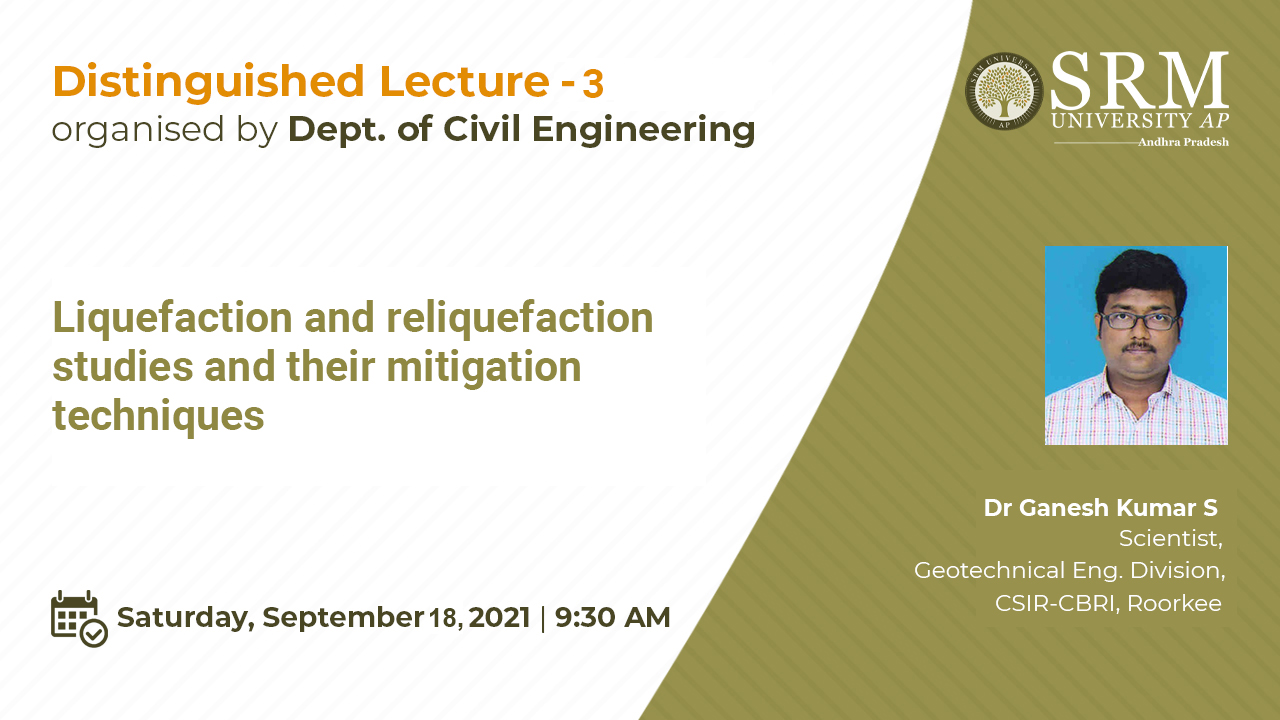 The third session of the distinguished lecture series organised by the Department of Civil Engineering is scheduled to be held on September 18, 2021, Saturday, from 9:30 to 10:30 am. Dr Ganesh Kumar S, Scientist, Geotechnical Eng. Division, CSIR-CBRI, Roorkee will deliver a talk on the topic “Liquefaction and reliquefaction studies and their mitigation techniques”.
The third session of the distinguished lecture series organised by the Department of Civil Engineering is scheduled to be held on September 18, 2021, Saturday, from 9:30 to 10:30 am. Dr Ganesh Kumar S, Scientist, Geotechnical Eng. Division, CSIR-CBRI, Roorkee will deliver a talk on the topic “Liquefaction and reliquefaction studies and their mitigation techniques”.
During an earthquake, liquefaction is one of the processes that occur in the saturated loose sand layer. It occurs when the pore water pressure reaches a certain level, which is near to the soil’s total stress. Structures built on top of or within the liquefied ground may fail to owe to ground settlement, which is one of the possible effects. The lecture aims to elaborate on the experimental studies on the liquefaction and reliquefaction potential of saturated ground and the use of ground improvement techniques for its improvement.
About the Speaker:
Dr S Ganesh Kumar is currently working as a scientist in Geotechnical Engineering Division at CSIR-Central Building Research Institute, Roorkee. He completed BE in Civil Engineering from Anna University and ME Geotechnical Engineering from Government College of Technology, Coimbatore. After his ME, he joined IIT Madras for his PhD. He completed PhD in the year 2014, working in the area of soft clay improvement using combined vacuum consolidation and geosynthetic encased stone columns. He has one year of academic experience and six years of research experience. He has published 7 papers in SCI and Scopus indexed journals and presented 18 papers in International and national conferences. His areas of interest include ground improvement techniques for soft clay improvement, ground improvement measures against liquefaction and reliquefaction hazards, and landslide control measures.
Join this engaging session on September 18, 2021, at 9:30 am to know more about liquefaction and reliquefaction studies and their mitigation techniques!
- Published in Civil Engg events, Departmental Events, Events, Webinars
Algorithms as the game-changer in the digital era
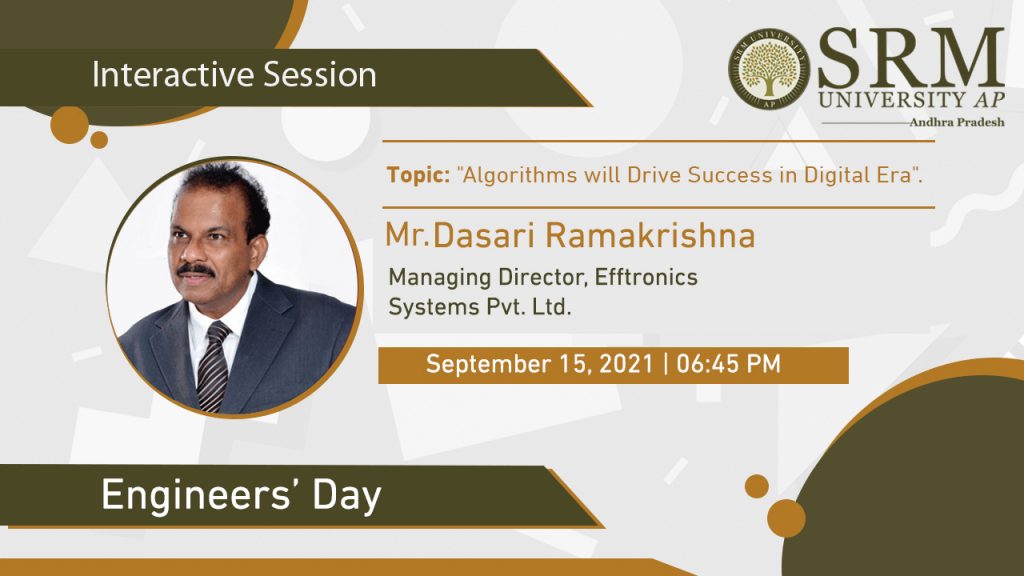 Industrie 4.0 has become increasingly global and cross-industry, driving digital transformation across industries, businesses, and governments. SRM University-AP observes National Engineers’ day with an inspiring talk by Mr Dasari Ramakrishna, Managing Director, Efftronics Systems Pvt. Ltd., on September 15, 2021, at 06.45 pm.
Industrie 4.0 has become increasingly global and cross-industry, driving digital transformation across industries, businesses, and governments. SRM University-AP observes National Engineers’ day with an inspiring talk by Mr Dasari Ramakrishna, Managing Director, Efftronics Systems Pvt. Ltd., on September 15, 2021, at 06.45 pm.
The heartbeat of the Fourth Industrial Revolution is algorithms. While algorithms are not new, the transition of businesses to be algorithmic is game-changing. Mathematicians describe an algorithm as an encapsulated set of rules that act on data to determine an outcome. In today’s digitalized world, companies use algorithms on a daily basis to influence and support decisions (fact-based decision making). In system development, algorithms building is the most challenging and major activity. Often engineers are expected to build completely new algorithms which are not available in the market (internet). One should adopt commonly available algorithms when required. But what is more important is to use various algorithmic concepts/principles together in combination to build a new algorithm. Like any development, algorithms building also follows the cycle of defining, analysing, designing, implementing, and testing iteratively in a systematic way. If one had to build algorithmic thinking, they need to practice with different scenarios, reflect upon the results and experiment continuously.
Every year on September 15, India commemorates Mokshagundam Visvesvaraya’s accomplishments by observing National Engineers Day. Visvesvaraya, the Bharat Ratna awardee, was born in the Karnataka village of Muddenahalli on September 15, 1861. As a pioneer in engineering, he made numerous contributions to the infrastructural backbone of the country.
About the Speaker:
Mr Dasari Ramakrishna is the founding CEO of Efftronics Systems Pvt. Ltd., established in 1985. Backed by rich R&D, Efftronics is now a leading provider of smart solutions for railway signalling, smart cities, smart buildings and industries. He is the architect of one of India’s largest IoT networks built for Indian railways with more than 6 million things connected across 9000 locations. He is a continuous learner & thought leader. Under his leadership, Efftronics has innovated more than 50 solutions for different domains. By continually growing Efftronics, Mr Ramakrishna has proved to the Indian industry that “With right aspirations and sincere effort to deliver value to customers, it is possible to be successful and location doesn’t matter.” He is the former chairman of CII- A.P State Council. He serves as a member of the board of studies, academic councils and governing body for several educational institutions and advisor for various universities.
Join this rekindling session on September 15, 2021, at 06.45 pm to understand the complexities of algorithm building.
- Published in Events, Research Events, Students Affairs Events
Light-weighting through composite materials & design concepts
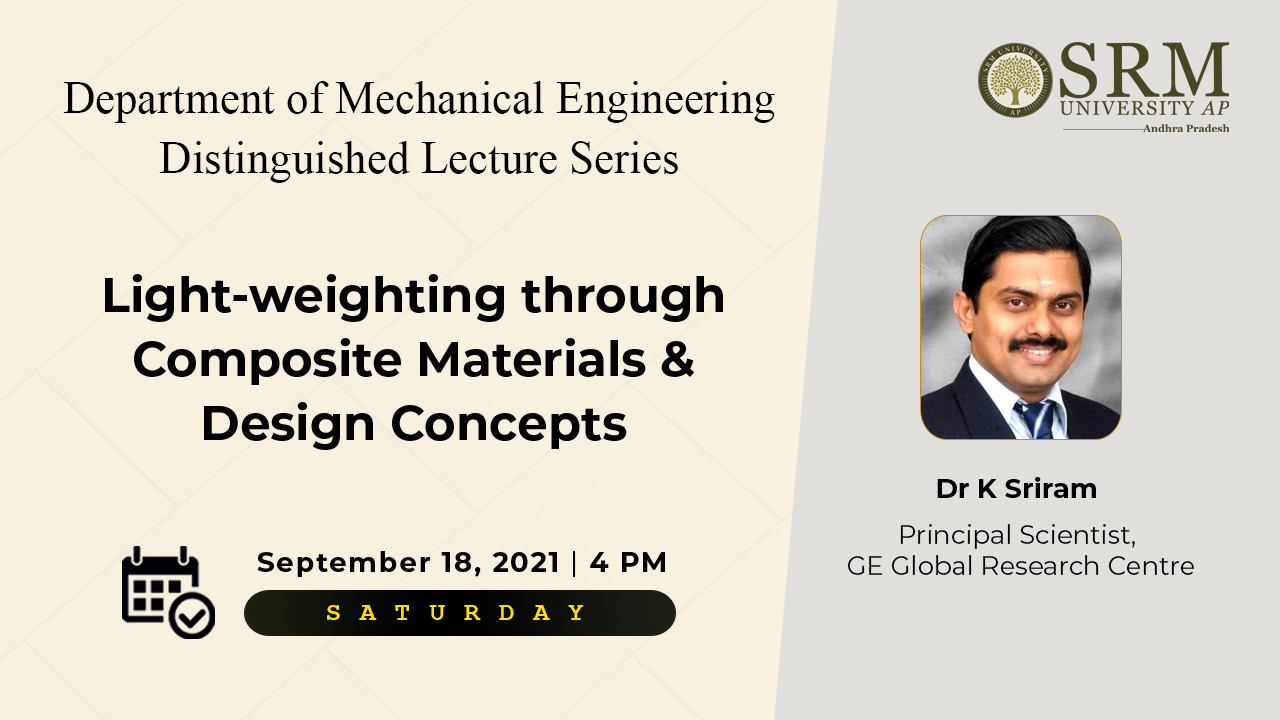 The Department of Mechanical Engineering at SRM University – AP organises the third episode of the Distinguished Lecture Series on the topic “Light-weighting through Composite Materials & Design Concepts”. Dr K. Sriram, Principal Scientist, GE Global Research Centre will engage the online session on September 18, 2021, Saturday, at 4:00 pm.
The Department of Mechanical Engineering at SRM University – AP organises the third episode of the Distinguished Lecture Series on the topic “Light-weighting through Composite Materials & Design Concepts”. Dr K. Sriram, Principal Scientist, GE Global Research Centre will engage the online session on September 18, 2021, Saturday, at 4:00 pm.
Light weighting of engineering products is traditionally performed to improve performance with the same or higher cost. The concept of light-weighting is changing the paradigm of many industries now with a big focus on affordability and sustainability along with improved performance/value. The future of light-weighting is tending towards solving the problem with systems and life cycle thinking by combining bio-inspired structures with multi-functional materials manufactured through the additive process that enable value, affordability and sustainability.
About the Speaker:
Sriram K is a Principal Scientist in Structural Materials organization located at GE Global Research Center in Bangalore, India. In this role, Sriram provides technical leadership in developing Composite materials for GE products by working closely with design, manufacturing, inspection and testing teams across businesses. Sriram joined GE in 2006, starting in GE Plastics as a researcher. In GE Plastics, he worked on product development for automotive and electronic applications. He successfully developed and commercialized HMD Cycoloy for BMW fenders and Bio-Lexan for mobile phone and laptop cases. Sriram moved to GRC in 2010 as part of the Manufacturing & Materials Organization as a composites researcher. His key contributions include GE9X Fan Blade with carbon-glass compliant trailing edge, High-temperature cracks growth behaviour in CMC’s for LEAP and GE9X, low-cost material selection for wind blade skin structures and All-Composite operator cab design, materials development and manufacturing for GLW locomotives market. His areas of expertise include composite materials & manufacturing, materials behaviour and deriving allowable. Sriram has a PhD in “Manufacturing and Durability of Composite materials” from Cranfield University, UK and a master’s from the University of Sheffield, UK.
Join this engaging webinar on September 18, 2021, Saturday, at 4:00 pm to know more about the light-weighting of engineering products through affordable and sustainable bio-inspired structures.
- Published in Departmental Events, Events, Mechanical Engineering, Webinars
An inspiring journey to winning TATA InnoVerse SolverHunt 10
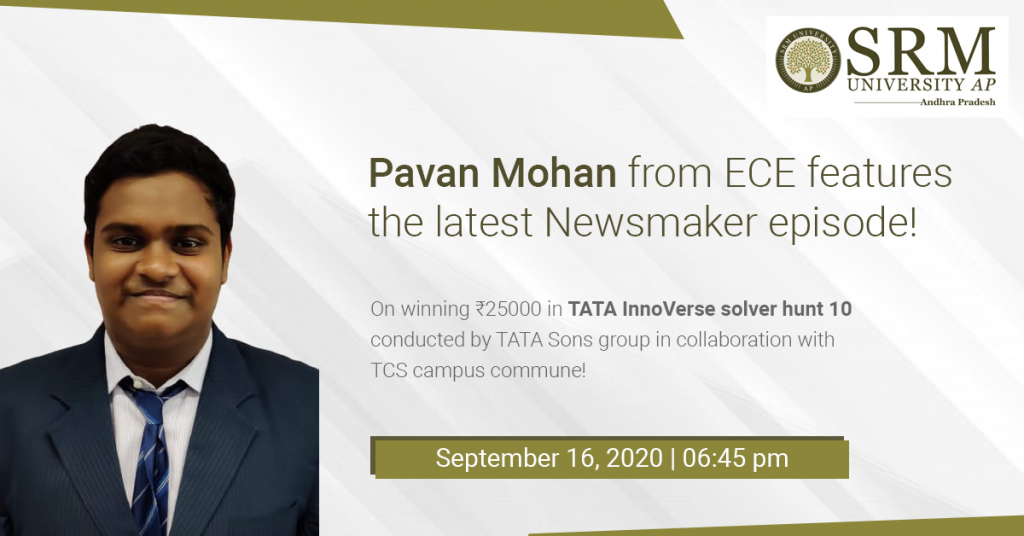 The Newsmakers series is popular among Gen Z for various reasons. The Department of Student Affairs started this series to inspire the students of SRM University AP with motivating stories from their peers. Recently, Pavan Mohan, an undergraduate student from the Department of Electronics and Communication Engineering, has received a monetary award of Rs.25000/- for winning TATA InnoVerse SolverHunt 10 conducted by Tata Sons’ Group Innovation. He will be featured on “The Newsmakers” to share his experience of the competition on September 16, 2021, at 6.45 pm. the event will be live-streamed on our official social media platforms.
The Newsmakers series is popular among Gen Z for various reasons. The Department of Student Affairs started this series to inspire the students of SRM University AP with motivating stories from their peers. Recently, Pavan Mohan, an undergraduate student from the Department of Electronics and Communication Engineering, has received a monetary award of Rs.25000/- for winning TATA InnoVerse SolverHunt 10 conducted by Tata Sons’ Group Innovation. He will be featured on “The Newsmakers” to share his experience of the competition on September 16, 2021, at 6.45 pm. the event will be live-streamed on our official social media platforms.
Tata Innoverse SolverHunt is one of the key projects of Tata Group that is aimed to use the ingenuity and agility of young minds to speed up the process of discovering solutions to some of Tata Companies’ most difficult challenges. Tata InnoVerse SolverHunt was created by Tata Sons’ Group Innovation to provide a platform for young minds to participate in collaborative problem-solving.
Join the exciting session today at 6.45 pm and learn more from Pavan himself.
- Published in Events, Students Affairs Events
The Narasimhan-Seshadri theorem and some of its ramifications
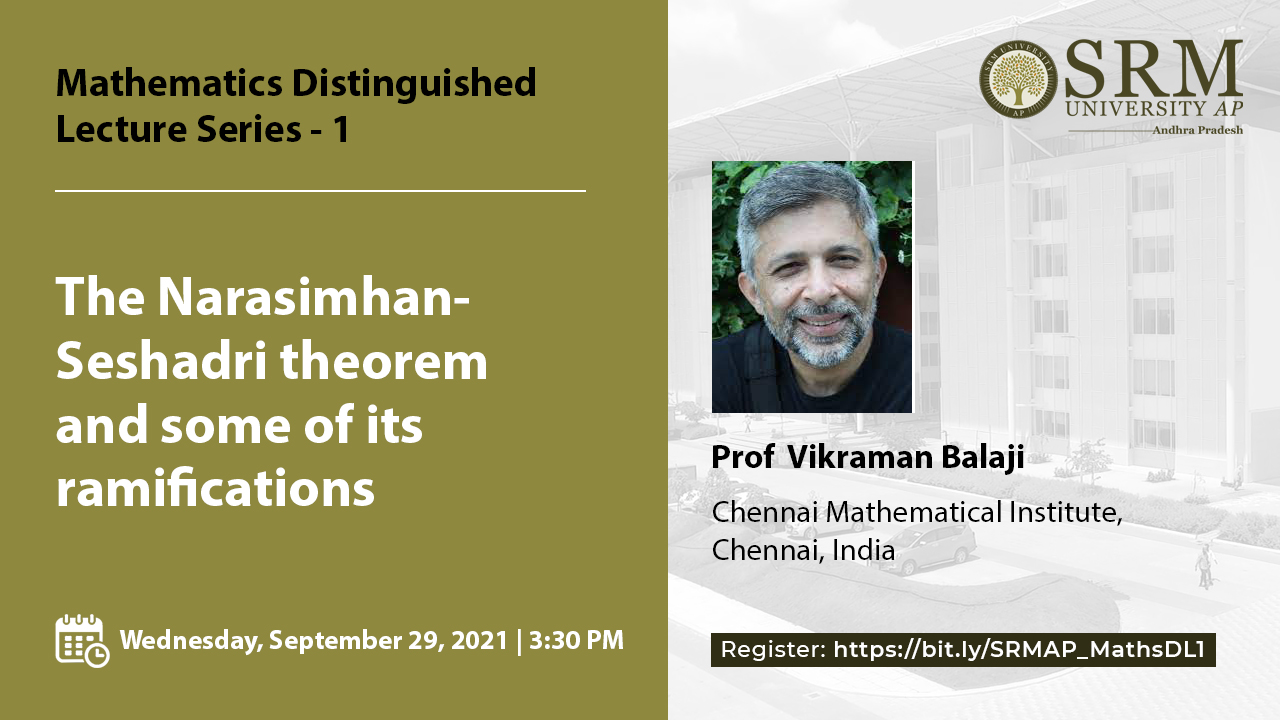 The Department of Mathematics at SRM University-AP organises the first episode of the Distinguished Lecture Series on September 29, 2021, at 3:30 pm. Prof Vikraman Balaji, renowned Mathematician from Chennai Mathematical Institute, Chennai, India will deliver a lecture on the topic “The Narasimhan-Seshadri theorem and some of its ramifications”
The Department of Mathematics at SRM University-AP organises the first episode of the Distinguished Lecture Series on September 29, 2021, at 3:30 pm. Prof Vikraman Balaji, renowned Mathematician from Chennai Mathematical Institute, Chennai, India will deliver a lecture on the topic “The Narasimhan-Seshadri theorem and some of its ramifications”
Abstract of the talk:
The Narasimhan-Seshadri theorem is one of the spectacular theorems from India in the past 50 years or so. The theorem is more than a deep result but is in a way philosophy or correspondences and symmetries. The theorem has had an impact on several aspects of mathematics. The theorem has also led to developments along lines that are similar but by themselves are also deep and central. Since the talk is for a general audience, I plan to give an overview of the theorem, a few of its big impacts in topology and geometry and a few of its ramifications in terms of generalizations.
About the Speaker:
Prof Vikraman Balaji is a renowned Indian Mathematician and currently a professor at the Chennai Mathematical Institute, India. He completed his doctorate in mathematics under the supervision of Prof C S Seshadri. His primary research area is algebraic geometry. He has made outstanding contributions to moduli problems over algebraic varieties. In particular, his work on ‘compactification of moduli of principal G-bundles over algebraic surfaces and his joint work with C.S Seshadri on ‘Parahoric torsors’ are very significant among his many other notable works. In 2006, he received the prestigious Shanti Swarup Bhatnagar Award in Mathematical Sciences and was awarded the J.C Bose fellowship in 2009. He was elected Fellow of the Indian Academy Of Sciences in 2007 and Fellow of the Indian National Science Academy (INSA) in 2015. He is presently an elected member of the National Academy Of Sciences, India (NASI).
Join this lecture on September 29, 2021, at 3.30 pm to understand the Narasimhan-Seshadri theorem and its impact on Mathematics.
- Published in Departmental Events, Events, Math Events, Webinars

